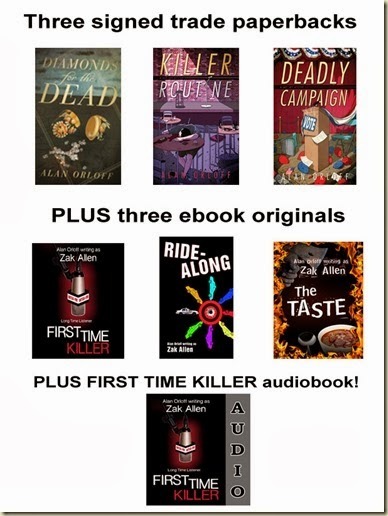Alan Orloff's Blog, page 5
February 20, 2014
Dream Team
If you could choose different aspects of famous writers, who would you use to construct your ideal writer (ie, plotting from James Patterson, characters from Carl Hiaasen, setting from Charles Dickens, etc)?
Here’s my dream team:
Plot – Michael Connelly
Characters – Tom Wolfe
Setting – J.K. Rowling
Pacing – John Gilstrap
Prose – Dennis Lehane
Hook/Premise – Michael Crichton
Plot twists – Jeffery Deaver
Humor – John R. Powers (go look him up!)
Emotional heft – Reed Farrel Coleman
Storytelling – Stephen King
Ka-Chingability – James Patterson
Feel free to agree/disagree/add your own choices in the comments!
(This entry is “simul-posted” on Criminal Minds.)
February 6, 2014
Just Call Me Cliff Cliffhanger
How do you know where one chapter ends and another begins? What *is* a chapter?
When I first started writing novels, I wrote them as if I were watching a movie. I’d start at the beginning of a scene, write until that scene ended, then begin another chapter. Each scene/chapter was its own distinct unit. In fact, when I wrote my very first “novel,” I saved each chapter in a separate Word document. (Talk about your logistical nightmares! Writers: DO NOT DO THIS!).
What did I know? I was as green as a guy who’d just downed a bucket of bad oysters while on a rollicking sea cruise (and that was the kind of simile I used in my very first “novel”).
My writing process has evolved over the years (thank goodness!). Now, I sit down and write a novel as one continuous story. One scene flows into the next, rinse and repeat. Start on Page One. Continue until I type “THE END.” I don’t even think about splitting my masterpiece up into chapters until I’m ready to finish the first draft.
Then I go back and figure out where to break it up to maximize the suspense.
Most of my chapters end up being approximately the same length, give or take. I’m not a fan of long chapters—I’d say most of my chapters run between 6 and 12 pages, depending on the genre. Short chapters usually translate to faster pacing, which is what I’m going for.
I try not to start chapters with characters waking up (although, I must admit, sleep happens!). I try not to end chapters with my characters rolling over and turning off the light as they end their days. I try to use a fair number of cliffhangers (but not TOO many). Sometimes I end my chapter at the end of a scene, but often I’ll end the chapter in the middle of a scene.
Basically, I try to leave my readers in a spot where they feel compelled to move on to the next chapter and keep reading.
(This entry is “simul-posted” on Criminal Minds.)
January 23, 2014
No Stupid Questions, Only Stupid Answers
What’s wrong with asking, “Where do you get your ideas?”
First, a little explanation about the question, “Where do you get your ideas?”
If you’ve never been to a writing conference or convention, or a book festival, you’re missing out. They’re great places for meeting other writers, meeting readers, learning about books, learning about writing, and learning about the hotel bar. One of the staples at a book event is the “authors panel,” which brings together four or five writers to talk (ostensibly) about a certain topic.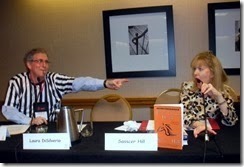
When I’m on a panel, my goal is to be entertaining (read: funny). I don’t always succeed, but I do try (that’s me in the photo, as panel referee, er moderator, at Malice Domestic, calling some sort of penalty on Sasscer Hill). After the panel discussion is finished, the audience generally gets a chance to ask some questions of the writers, and invariably someone will ask where we (writers) get our ideas.
It happens so frequently that it’s become an “inside joke” among the writers. Of course, there’s nothing wrong with the question—in fact, I think it’s a pretty good question. I just wish I had a better answer.
Because I DON’T KNOW WHERE I GET MY IDEAS. They just pop into my head, when I’m sitting in my car, taking a shower, reading the newspaper, daydreaming, watching TV, eating, cooking, shopping, sleeping (yes, I once woke up with an awesome idea). My problem is not a dearth of ideas; it’s a lack of time to write about them all.
Remember, as my grade school teachers used to say: there’s no such thing as a stupid question.
Just my stupid answer.
(This entry is “simul-posted” on Criminal Minds.)
January 9, 2014
Please Pass the Chianti!
Everyone probably has a favorite detective, but who is your favorite fictional murderer?
Ah, so many evil criminals to choose from. But if I’m going to go dark, I might as well go big and select one of the most diabolical, twisted—and formidable—villains ever created: Hannibal Lechter.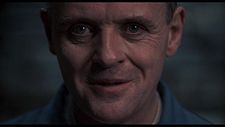
Let’s face it. You liked him in Red Dragon. You loved him in Silence of the Lambs. Of course, if you’re like most of the reading population, you really loathed him in Hannibal (and loathed the story, too; it was the one book I actually threw across the room in disgust when I finished). And after reading Hannibal, you probably avoided him altogether in Hannibal Rising (I know I did).
He had it all. A brilliant mind. A refined elegance. A very warped sense of morals with no reluctance to act on them. And when you’re ranking bad guys, cannibalism counts for a lot.
So to recap: I’d choose Hannibal Lechter as my “favorite” murderer.
But I wouldn’t invite him over for dinner.
(This entry is “simul-posted” on Criminal Minds .)
December 12, 2013
Blinders On!
Last week, I finished the first draft of a new novel. It’s a slightly different genre than most of my books, and I had a fun time writing it. However, it looks a lot like most of my first drafts.
That is to say (depending on my mood): putrid, puerile, bad, awful, mediocre, stilted, too short, too long, infantile, off-the-wall, brilliant, boring, too fast paced, nonsensical, unsalvageable, too slow-paced, and/or hideous. I followed Ann Lamott’s priceless advice and gave myself permission to write a $#!^^y first draft. I’m proud to say that I succeeded!
My method:
When I write a first draft, I plow through, from beginning to end. I don’t go back and edit what I’ve written along the way. If I change a character’s name halfway through, I don’t go back and change it. If I add a subplot or change a location or introduce a new character altogether, I don’t go back and fix things up. If I don’t know the name of something (or if I forget the name of a character), I put in XXXX and keep on typing, knowing I’ll take care of it later. Ever forward.
My rationale:
This strategy was borne of laziness. I don’t want to spend time editing and revising something that’s going to get cut in the second draft. So I put on my blinders, sit down, and pound out the best story I can (I do outline, which keeps me somewhat on track). As I go along, I note all the changes I’ve made so I can go back and fix things. Once I’ve finished, I can step back and take an objective look at the entire hot mess. Invariably, it needs a lot of work.
But I guess that’s what the revision process is for.
How about you, writers? Do you fix/edit/revise as you go? Or do you wait until everything’s done and go back and fix it then, once you see the big picture?
Top Ten Best Things About A First Draft
10. You can test-drive a few adverbs without getting yelled at.
9. It actually sounds better when read aloud with an Inspector Clouseau accent.
8. It provides amusement for your critique partners.
7. You can use lame jokes, stereotypes, bad grammar, and stilted dialogue, knowing (hoping?) they'll disappear during the revision process.
6. It's a good way to use up scratch paper.
5. You don't have to show it to your agent, editor, or spouse.
4. Your dog/cat/gerbil thinks it's terrific, no matter how many words are misspelled.
3. It makes good kindling.
2. It helps support the market for red pens.
And the number one best thing about a first draft:
1. There's only one place to go from there: Up.
(This entry is “simul-posted” on Criminal Minds.)
November 14, 2013
Who Loves Ya, Baby?
Why crime? What is it about the gutters and dark alleys of the
world that compels you to write crime fiction?
Because we’re talking crime here, I think it’s appropriate to use, uh, bullet points.
Justice – I have a well-developed sense of right and wrong, but in the real world, justice doesn’t always prevail. In my world, justice does prevail, often with extreme prejudice. High stakes, high drama – Often, crime is about life and death. For the victims, for the perpetrators, for those suffering the fallout of life-shattering events. Writing about characters in these situations makes for compelling drama. Anything goes – criminals do some nasty, nasty things, so as a writer, I don’t feel constrained in any way about what I can write about. I can be as nasty as I want!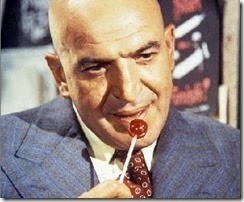 Fascination – As a kid, my TV diet consisted of the great cop/detective shows of the 70’s: Mannix, The Rockford Files, The FBI, Adam-12, Barnaby Jones, Ironside, McMillan & Wife, Banacek, Columbo, Streets of San Francisco, Tenafly, Cannon, Baretta, Starsky & Hutch, Kojak, McCloud, Harry O, Shaft, Cool Million, and for some reason, Police Woman and Charlie’s Angels. For me, it’s not so much “write what you know,” but “write what you’ve watched a million times.” Inside knowledge – It would be a shame to waste the 15 years I spent at Leavenworth.
Fascination – As a kid, my TV diet consisted of the great cop/detective shows of the 70’s: Mannix, The Rockford Files, The FBI, Adam-12, Barnaby Jones, Ironside, McMillan & Wife, Banacek, Columbo, Streets of San Francisco, Tenafly, Cannon, Baretta, Starsky & Hutch, Kojak, McCloud, Harry O, Shaft, Cool Million, and for some reason, Police Woman and Charlie’s Angels. For me, it’s not so much “write what you know,” but “write what you’ve watched a million times.” Inside knowledge – It would be a shame to waste the 15 years I spent at Leavenworth. Crime: it’s what all the cool kids are writing!
(This entry is “simul-posted” on Criminal Minds.)
October 31, 2013
Ch-Ch-Ch-Changes
How has writing your main character changed you as a person?
I’d like to think that writing about my protagonist (any of my protagonists) has made me into a sharper, more self-actualized, wittier, more thought-provoking, more handsome person.
I’d like to think that, but I can’t.
I’m the same semi-schlubby person who wears sweats when he writes. Who occasionally spills food on his shirt. Who sometimes forgets a word that he used JUST YESTERDAY which bugs the crap out of him. Still the same guy who roots for the Washington Professional Football Team no matter how poorly the team plays.
Now what has changed, due to my writing, is my writing. The more I write, the better I get (at least I think so). I came to writing fiction relatively late in life, as compared to many of my contemporaries, so I’ve had to learn a lot in a short amount of time. And I’m still learning (I’m a little weak on grammar; I don’t know a dangling participle from a flying Wallenda.).
With each scene I write, with each draft and second draft and eighth draft, I feel more comfortable creating new worlds and characters. More comfortable with plots and descriptions and dialogue and settings. More comfortable using the strike-through feature. More in control of my story.
More like a real writer.
(This entry is “simul-posted” on Criminal Minds .)
October 17, 2013
Good Morning, My Ass!
Do you ever take out real life rage on fictional murder victims? Are any of your victims based on people who pissed you off in real life?
Real life rage? I’m a mild-mannered guy. I very rarely get to the stage of “rage.” About as hot as I get is “slightly perturbed.” If things really go wrong, I might push the meter to “irked.”
Unless you count that guy who cut me off on the Beltway. Or the person who dented my bumper in the parking lot and didn’t leave a note. Or the telemarketer who woke me up at 5:30 in the morning. Or maybe if you consider the neighbor who runs the leafblower six hours a day during Fall. Or the bank teller who takes forever just to log in a simple deposit. Or the grocery store that didn’t have one SINGLE RIPE AVOCADO when I needed to make guacamole. Or the little old lady who said “Good Morning” to me when it wasn’t really such a great morning. I mean, who died and elected her Queen of Inane Greetings, anyway?
Okay, maybe I do have a slight anger management issue.
In my books, though, I can’t remember singling out a specific person, either as a victim or a criminal, to be the recipient of my real-life rage. (I definitely don’t want a lawsuit. I’m pretty sure that would piss me off.)
But in my book DEADLY CAMPAIGN, I went after an entire group of people—politicians. (Of course, after the events of the last month, is there a person in this country who doesn’t harbor a great deal of rage toward them? For the record, I wrote that book before it was in vogue to actively hate our congressfolk). I didn’t take sides; I skewered the politicos in a bipartisan fashion (I’m an equal opportunity skewerer.)
And I must confess, it felt pretty good.
*******
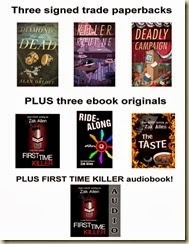 Here’s something else that feels pretty good. Giving away stuff! To celebrate my birthday, I’m giving away an ORLOFFAPALOOZA prize package to one lucky winner: A copy of all six of my books (three trade paperbacks, three ebook originals) plus a bonus download of FIRST TIME KILLER in audio. Click thru to enter. Go ahead, don’t be shy…You gotta play to win!
Here’s something else that feels pretty good. Giving away stuff! To celebrate my birthday, I’m giving away an ORLOFFAPALOOZA prize package to one lucky winner: A copy of all six of my books (three trade paperbacks, three ebook originals) plus a bonus download of FIRST TIME KILLER in audio. Click thru to enter. Go ahead, don’t be shy…You gotta play to win!
(This entry is “simul-posted” on Criminal Minds.)
October 9, 2013
An ORLOFFAPALOOZA Birthday Giveaway
This year, for my birthday, I want to give YOU a present! Welcome to the ORLOFFAPALOOZA BIRTHDAY GIVEWAY!
Here’s what one lucky winner will receive:
To participate in this giveaway (powered by Rafflecopter—if you don’t have an account, you can sign up—it’s free!), click on the image below, and go crazy. The more points you earn, the better your chance of winning!
Giveaway ends October 26—my birthday.
GOOD LUCK!
October 3, 2013
Green is the New Blech
Seeing Green: In Bird by Bird, Anne Lamott spends a lot of air time on writer envy—that bile inside her that bubbles to the surface any time a friend (or frenemy) wins a big award or sells movie rights. Do you suffer from the same affliction? How do you combat it?
There’s always someone richer than you.
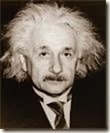 There’s always someone smarter than you.
There’s always someone smarter than you.
There’s always someone more interesting than you.
There’s always someone nicer, tougher, funnier, more determined, luckier, prettier, taller, smoother, stronger, happier, better connected, flashier, more skilled, more beloved, more respected, more more MORE.
Comparing yourself to other people is a losing proposition.
On the other hand, it’s human nature to be competitive, and writers are an observant lot. So it’s pretty hard not to notice how well other people are doing, and it’s pretty easy to feel those pangs of envy as your fellow authors win their shiny awards and get those three-book contracts and sign their six- and seven-figure movie deals, for work that’s no better than the stuff I spill my blood over and grrr, I hate their steaming guts. Kudos to them all.
Personally, not long after I jumped into the writing “biz,” and realizing what kind of nutty, often random, business it seemed to be, and seeing a lot of unhappy, bitter writers complaining about all sorts of things, most of which they couldn’t control, I made a vow to myself:
No matter what happens, I’m going to try very hard not to let things that don’t go as I wish get me down.
I think I’ve been pretty good about it. I try very hard to generate the best work I know how and let the chips fall where they may. If I never hit the New York Times Bestseller list, so be it.
I’ll still hit number one on Alan’s Gave It Your Best Effort list.
And that’s about all I can control.
(This entry is “simul-posted” at Criminal Minds .)

